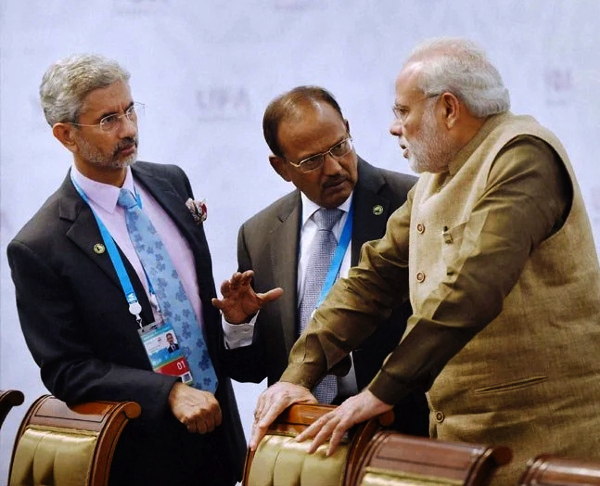A bold and historic decision has been taken by the Narendra Modi government to scrap Article 370/Article 35A, separate Ladakh from Jammu and Kashmir (J&K), and make both of them Union territories (UTs). It would have undoubtedly considered at length its internal and external repercussions. If immediate violence on the ground may be prevented because of large-scale security deployments, the challenge would be to control violent protests once the local forces organise resistance on an Islamic platform, fuelled by propaganda in mosques and instigation from abroad.
Pakistan will do its best to promote clashes between protestors and the security forces so that it can highlight the issue of human rights violations in J&K. Already in July 2018, India had to strongly rebuke the United Nations Human Rights Commission in Geneva for its biased report on human rights violations in Kashmir. We have coped with such partisan attacks since 1990s in much more difficult external circumstances when western human rights organisations were targeting us viciously on the issue, and the US was unsparing in its criticism.
One can expect the Pakistani parliament to pass an all-party resolution condemning and rejecting India’s move. Massive demonstrations in Pakistan against India’s step could take place, but if jihadi organisations are too visible and call for violence against India, Islamabad will have to worry about the impact of this fervour on its commitments to the Financial Action Task Force (FATF) to curb the supporting structures of terrorism on its soil, besides preserving the right atmosphere for receiving the financial bailouts it needs.
Pakistan will surely approach the UN Secretary General and the Security Council on what it will argue are steps that are repugnant to Kashmir’s “disputed” status and are violative of UN Resolutions. It will accuse India of “illegally” integrating Kashmir fully into the Indian Union, violating the rights of Kashmiris, defying the international community, disturbing peace in a sensitive region and creating tensions that could degenerate into a conflict transcending India’s borders. Pakistan may make some propaganda capital for domestic consumption but is unlikely to get any substantial satisfaction.
India has consistently maintained that J&K is an integral part of India; that third parties, including the UN, have no role in J&K (which is why we do not recognise the writ of UNMOGIP on our side in J&K); and that the J&K issue has to be discussed bilaterally between the two countries as per the Simla Agreement. This may not deter the UN Secretary General’s office from issuing some objectionable statement, as it did very recently on “armed conflicts” in Kashmir and the Maoist belt, ignoring altogether the element of terrorism in both cases. We will, of course, reject any such statement if it is issued.
The UN Security Council (UNSC) can hardly take cognisance of Pakistan’s complaint. We may have already briefed the UNSC members, including the P-5, of the purpose of our legislative move. Pakistan is bound by the Simla Agreement, which excludes the jurisdiction of the UN. Former secretary generals have conceded that the UN Resolutions on Kashmir are no longer applicable.
America’s stated official position is that Kashmir is a bilateral issue to be resolved between India and Pakistan, which is also the position of all major countries, including France and the UK. US President Donald Trump has proposed mediation, if both sides want it, but it is American, not UN intervention, that he has in mind. Pakistan will of course seek Trump’s intervention on the ground that the Indian move will interfere with its efforts to midwife the peace process in Afghanistan.
One cannot see the US, Russia, France or the UK agreeing to inscribing the issue on the UNSC agenda and, merits apart, risk severely straining ties with a rising India, and even China giving a thumbs-up and jeopardising the second informal summit between Prime Minister Modi and China’s President Xi Jinping in India later this year.
Beyond all this, Article 370 was introduced after the defunct UN resolutions on J&K, and therefore, the UN has no locus standi in the matter. One may recall that, in 1970, the territory of present day Gilgit-Baltistan was made into a separate administrative unit in Pakistan under the name “Northern Areas”. In January 2019, Pakistan’s Supreme Court passed an order involving Gilgit-Baltistan to which India objected on the ground that the court had no jurisdiction over an area belonging legally to India. At best, Pakistan can lodge a protest to India on changing the legal status of J&K within the Indian Union.
Pakistan can activate the Organisation of Islamic Cooperation (OIC) on the issue, especially the OIC Contact Group on Kashmir, but given our vastly improved relations with the Gulf countries in particular, it is unlikely that it will obtain support from the OIC at large.
Most importantly, India’s move deflates Imran Khan’s propagandist peace moves towards India. Now, there is no scope for discussing the “outstanding issue” of Kashmir with Pakistan in any “comprehensive” dialogue, which means that the likelihood of any resumption of dialogue to normalise relations has receded further. Pakistan has been outflanked by India.
All in all, the Modi government has taken a risky but much needed step in the long- term interest of the country and deserves applause for this.
Kanwal Sibal is former foreign secretary
Source: HT
Image Courtesy: Rediff
You may also like
-
IAF Aircraft Set Course For Exercise Eastern Bridge VII At Oman
-
India-us Working Together In Areas Like Critical Minerals, Supply Chains And Advanced Technologies: Shri Piyush Goyal
-
Defence Secretary to co-chair 5th India-Philippines Joint Defence Cooperation Committee meeting in Manila
-
2nd India-Japan Finance Dialogue held in Tokyo on 6th September, 2024
-
Prime Minister, Shri Narendra Modi welcomes Crown Prince of Abu Dhabi
